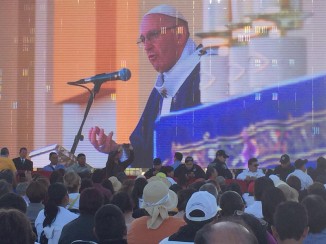By Robyn Feiser
 Nearly 300,000 worshippers participate in the "border mass" celebrated by Pope Francis in Ciudad Juarez Mexico on February 17, 2016, on the border with El Paso, Texas where thousands of migrants attempt to cross the border illegally every year. Photo by Oscar Leiva/Silverlight for CRS
Nearly 300,000 worshippers participate in the "border mass" celebrated by Pope Francis in Ciudad Juarez Mexico on February 17, 2016, on the border with El Paso, Texas where thousands of migrants attempt to cross the border illegally every year. Photo by Oscar Leiva/Silverlight for CRS
When Pablo* decided to quit his job as a cashier at a San Salvador convenience store and take his chances migrating to the United States, he knew it would be hard. He knew he would spend days walking through the desert. He figured he’d find himself at the whim of police officers who would harass and demand bribes along the way. He thought he might even go hungry on occasion.
But when the 20-year-old said goodbye to his family in May—with just $80 in his pocket—he never imagined the nightmare that awaited him. He was kidnapped in northern Mexico by the Gulf Cartel, a powerful drug and human trafficking network, and held for ransom for 5 weeks.
“It was the worst experience of my life, even worse than the gang threats my family was living with in El Salvador,” he says.
Pope urges human rights protection for migrants
When Pope Francis visited Mexico recently, he sought to draw the world’s attention to the plight of migrants, refugees and asylum seekers like Pablo who stream toward the United States from Central America in search of protection from violence by gangs and organized criminal networks.
Despite more aggressive enforcement in the last year by the United States and Mexico, hundreds of thousands of Hondurans, Guatemalans, and Salvadorans continue to flee.
The surge coincides with heightened corruption and gang violence in the Northern Triangle countries of Guatemala, Honduras and El Salvador, where 2015 murder totals exceeded death tolls in all the world’s war zones except Syria, Iraq and Afghanistan. Gangs in all three Central American countries control entire neighborhoods. They extort businesses and recruit impoverished and vulnerable youth as young as seven with join-or-die policies that terrorize families and often keep children from going to school.
Pope Francis has made concern for migrants and refugees a centerpiece of his papacy. He is calling on people to turn away from an attitude of indifference toward people desperate to flee poverty and persecution.
Nobody understands the “culture of indifference” better than Pablo.
Decision
https://www.youtube.com/watch?v=6HvlkNqxiSA
“Everybody takes advantage of us,” he told Catholic Relief Services in mid-January. He was in San Salvador, just weeks before he would embark on a second attempt to enter the United States. “It’s all a business and everyone benefits from us to some degree, from the smuggler to the police. It’s very hard.”
As he sees it, he never had a choice. A neighborhood clique of the notorious 18th Street Gang had its eye on the soft-spoken son of a known police officer. Gangsters would pounce on him as he made his way to work, taunting him about his father and demanding that he join their ranks. When he refused, they threatened his family.
“To see someone tattooed, high and aggressive like that—and he tells you he is going to do something—you get scared,” Pablo says.
It was no idle threat. Some 64 police were murdered in El Salvador in 2015—more than any year on record. The number had been going down since 2012, when a truce between the gangs cut the country’s murder rate nearly in half, sparking hope that the country might finally see peace. But the truce collapsed after 15 months, and violence has again skyrocketed, as police and gangs battle it out. Last year, at least 6,600 people were killed in El Salvador. It was the most violent year since the height of the country’s civil war.
Pablo’s father finally reached out to his brother in Washington, D.C., for help. The uncle agreed to lend the family $4,000 for a deposit a smuggler required to take Pablo to the U.S. border. They would pay the other half of the $8,000 fee once he made it across.
The month it took to get through Mexico was a blur of bus trips interrupted by long walks through the hills to avoid immigration checkpoints. The police could get violent—Pablo saw an officer pistol whip a man for not having money to pay a bribe.
Kidnapped
https://www.youtube.com/watch?v=my4YesVa6Lc
Outside of Reynosa, Mexico, an industrial city 10 miles from Brownsville, Texas, the trip took a particularly bad turn. That’s where the group of migrants Pablo was traveling with were taken by gunmen from the Gulf Cartel.
The gunmen put them in a windowless abandoned house with as many as 100 other migrants and refugees. They called Pablo’s family and demanded $2,000 to free him. They wanted another $2,000 to get him across the border.
“The nights were hell, and one night felt like a week,” says Pablo. “It was impossible to even turn your head to sleep because we were so packed in.”
The victims, some handcuffed and beaten, came and went. Pablo never knew if they were set free because they finally paid the ransom or were killed because they couldn’t.
Kidnapping has become rampant in Mexico in recent years as drug networks, which are increasingly fragmented, turn to new sources of money.
There were 682 reported migrant kidnappings in Mexico in 2014, an increase of 1,000% over the previous year, according to InSight Crime, which studies organized crime in Latin America.
Father Arturo González, director of Jesuit Migration Services in Mexico, says increased enforcement through the Southern Border Program has sent migrants searching for alternative, but more dangerous routes that feed them right into the hands of criminal networks.
Jesuit Migration Services in Mexico supports a network of 14 Church-run migrant shelters across northern Mexico that work to keep migrants safe and provide a place to eat and rest along the way. But fewer migrants are passing through the shelters these days, González says, because of fear they will be targeted.
Catholic bishops from the northern states of Mexico say they hope Pope Francis’ visit, particularly the Mass in Ciudad Juarez, the northern Mexican city that shares a border with El Paso, will prompt lawmakers from both countries to create polices that protect migrants, refugees and asylum seekers.
“Those of us on the border have spent many years finding ways to support people who suffer in this migration phenomenon, and we know there needs to be serious changes so that their human rights are respected and so that they can find a way of taking care of their families,” says Bishop Alonso Garza Treviño, of Piedras Negras.
In the United States, that would include creating more legal pathways for migrants, refugees and asylum seekers to travel safely and find protection. Pableo never received legal representation to help him make his case.
He spent 3 months in detention—in Texas and Louisiana—after being picked up by U.S. Immigration and Customs Enforcement in Brownsville, Texas.
Deported
https://www.youtube.com/watch?v=my4YesVa6Lc
Officials asked him if he wanted to apply for asylum, a form of protection granted to people who are unable or unwilling to return home because of fear of serious harm. He had one video interview with an immigration representative, who didn’t ask for details about the gang threats. And nobody wanted see the police report documenting those threats, which Pablo carried on his journey at his father’s suggestion.
In the end, his credible fear argument was rejected. He was deported back to El Salvador in December 2015. While he was away, four people in his neighborhood had been murdered.
A few weeks later, he boarded a bus to Guatemala. It was the second of three tries his smuggler included in his $8,000 fee.
With no job and so much debt, Pablo felt like he still had no other choice.
“I am going to take the risk, even if they [U.S. Immigration and Customs Enforcement] do pick me up again,” he says. “It will be one less affliction for my parents—a relief—knowing that at least I am safe and am not going to be killed outside my house.”
*Name changed for security.
See Also...
| Much of the work CRS does around the world helps families stay in their homeland. Help reduce factors that push people to migrate. | Download a free book of inspiring quotes from Pope Francis. |
| Read more about Pope Francis' Mexico visit. | Use these resources in your Catholic communities to journey with Pope Francis and respond to his teaching. |
 Robyn Feiser is the regional information officer for CRS in Latin America and the Caribbean. She raises awareness about CRS’ humanitarian and disaster relief programs, serving as a contact for key news outlets and coordinating coverage of emergency and development stories. From a base in the Dominican Republic, she travels throughout the region to report in-depth stories on disaster preparedness and recovery, immigration, and climate change and its impact on small farmers for the agency’s fundraising and advocacy efforts.
Robyn Feiser is the regional information officer for CRS in Latin America and the Caribbean. She raises awareness about CRS’ humanitarian and disaster relief programs, serving as a contact for key news outlets and coordinating coverage of emergency and development stories. From a base in the Dominican Republic, she travels throughout the region to report in-depth stories on disaster preparedness and recovery, immigration, and climate change and its impact on small farmers for the agency’s fundraising and advocacy efforts.
About the Author

Catholic Relief Services
Catholic Relief Services is the official international humanitarian agency of the Catholic community in the United States. We are the official overseas relief and development agency of the U.S. Conference of Catholic Bishops and a member of Caritas International and the National Catholic Development Conference. Find us on Facebook, Twitter, YouTube, Google Plus and Pinterest.


.png?width=1806&height=731&name=CatholicMom_hcfm_logo1_pos_871c_2728c%20(002).png)
Comments